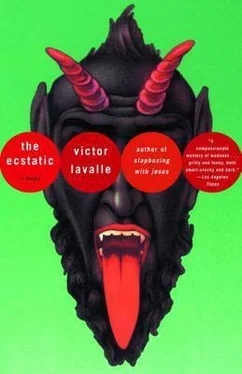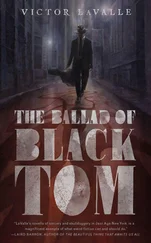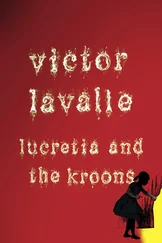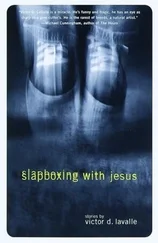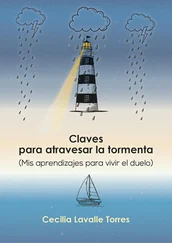When I showed this photo to the bartenders they recognized Mom, but not by the name we gave. That’s your mother? each asked, laughed, smiled, winced then answered. She left here but was going to Dell’s. To the Doughboy. And so forth.
Until we got to the sixth bar, Right Not Left. Where the woman serving drinks hopped on one foot, saying, — She just left. Right out the back door. With an Indian.
— Southern Ute? I asked.
— From Uttar Pradesh.
We found her outside holding hands with an Indian guy who had a twiny mustache so thick he could have been a Bollywood porn star; a brown Harry Reems had his arm over her shoulder. The trunk of his car was open so I could see black plastic bags in there piled a foot high. I wondered what was in them; probably just groceries.
It’s true my mother had become magnetic. The Indian looked at her almost as intensely as Grandma and I did. He wouldn’t step more than five inches far. Without seeing her face I’d have thought this whole scene was criminal because he looked fifty, but Mom was a summery sixteen.
She wore tan capri pants to exhibit her calves. Her cotton long-sleeved jersey was vacuum-wrapped around her torso; this made her look sporty. Forget heels or even shoes, she wore plain green sneakers that reduced her feet to snow peas.
— You really won’t say, will you? He had one of those deep voices that make men who have them always need to be talking.
She said, — If I told you I was a bank robber you might turn me in.
— But first I’d let you tie me up at your hideout. He smiled, it wasn’t even lecherous.
Maybe the plastic bags had the dog figurines; why would she need them if not for me? To decorate a new home? They shut the trunk together; a move that looked cute no matter who the couple was. I stepped back to hide, but if Mom was indeed having another episode she wouldn’t recognize us even if I climbed right in their car.
— Doonay, she said to him. Doonay. I like your name, but it’s not the one your parents gave you, is it?
— Doonay is what everyone here calls me. It’s a nickname.
What if he was a serial killer; this is how that kind of things happens, yes? The scene could have come from Murder Makes Me Writhe or a thousand others. The overtly sexual woman in need of riding. Driven off by a stranger who dismembers. They were always doing that, the young women; being punished I mean.
— Hey, you can’t be angry at me, Doonay said lightly. We met two hours ago and you haven’t said your name at all.
— Mine? It’s like yours. Too hard to pronounce, she said. You just call me Yummy.
They made into the car. My fingers smelled like dirt; I’d put my hands to my face.
He drove a black Monte Carlo, a very fast attraction. He might have had the nitrous oxide cannister attachment in the trunk; it makes the car go even faster for short bursts.
Mom laughed with him; the window was down. Grandma and I had been very close to them, but I walked us even closer. Casually Mom looked out at us.
As we stared she showed surprise, but no recognition. Frightened by this ambling creature to her right, Mom rolled her window up halfway. She stopped when we didn’t attack her. Also Doonay was pulling out. After her shock passed she only gawked at us and started to laugh in an uncomfortable way, turning her whole body in the seat.
She looked back at us again. Doonay looked, too. Mom’s life before this moment had been erased. Unaware that she would ever or had ever done anyone wrong, my mother was like a newborn. My mother was innocent.
— I could go stop her, Grandma.
— You could not.
The Blue Ridge Theatre was splendid from all sides. Windows scrubbed and its lights on. With skinny young Marines on duty as ushers; they were nervous boys but the uniforms composed them. And toward the back of a large crowd of parents, siblings and friends was a couple; one standing, one sitting; they promenaded.
The man on his feet, washed and oiled, was me; the woman was Grandma in a wheelchair borrowed from the Hampton Inn. I thought the hotel would charge me extra, but as long as I was registered, apparently, I was trustworthy. Pushing my grandmother instead of carrying her on my back made me respectable. Normal. Which is all I hoped to be. Three different people held doors for us.
I wasn’t rancid anymore. Grandma wore a lumber-colored dress with a black cloche that was loose on her small head. Backstage Nabisase was wearing an orange gown and three brass bracelets on her left wrist. I had seen the outfit in the car trunk, but not on her. There were enough black girls in the contest that at least one of the backstage-beauticians would know how to do my sister’s hair.
We were happy. Grandma, Nabisase and even me.
Of course she would come back, maybe even get to Queens before us. Until that time there was relief. An unfortunate word to use when talking about the loss of a family member, but Mom wasn’t deceased, only departed.
Will you feel this way about me? I wondered. I wanted to ask Grandma, but what could she say that wouldn’t sound patronizing. I wouldn’t have wanted her to be honest.
The Blue Ridge Theatre had two grand auditoriums and seven smaller ones on the second floor. It was a strapping building. On the walkway outside there were these fire-hydrant-size lampposts every five feet. The white lights normally in them had been replaced so that there was a multi-colored gumball procession of bulbs.
Who felt better than me? I belonged like an alligator in the Everglades.
My green suit would be a shamrock-shame in tasteful places, but hardly anyone was dressed well. The fine designers at Bugle Boy outfitted most fathers and brothers. The best of them wore boat shoes. Those flat plastic slippers you get with a tuxedo rental would have stood out as much too worldly here.
One man, carrying his baby to his stomach, wore a denim shirt with the masonic symbol stitched on the back. Prince Hall it was huge: the compass, that capital letter G. This was a man in a secret society and he wanted everyone to know it.
Grandma’s wheelchair bestowed influence. Wherever I pushed her the crowd cleared away. I made it a game, seeing how many times people would move, but Grandma stopped me because she wanted to get inside.
The lobby’s walls were yellow. The floor was gray with occasional large maroon painted squares; young kids stood in those boxes playing games of endurance— who could stay inside the lines the longest.
One boy was winning over everyone; a few adults even cheered him on. He had red hair and black jeans tucked into his white boots. His father walked over, ignored the game, touched his son on the back of the head and said, — I’m missing you.
Then led his son away.
There were a pair of potted rubber plants in the lobby eight foot high. Two young Marines stood next to them asking people to walk inside. One was lucky, but his partner wasn’t.
— Ma’am, would you please continue to walk, the unlucky one told an obstinate woman with hairy forearms. She was determined not to move until she’d examined everything in her purse.
— Ma’am, I’ve asked you three times.
— Well then stop, she said.
Grandma gave our tickets to yet another Marine inside the auditorium. They were everywhere. They were dignified.
When the boy who’d taken tickets from Grandma noticed that I wasn’t following, just looking around, he came back and took my arm.
— Hello sir. My name is Ahab. Please let me help you to your seat.
I tried to pull free, but he had an intimidating grip.
Grandma laughed at me when the kid went away. — He was going to strike you, she said.
— I wouldn’t have wanted that.
Читать дальше
